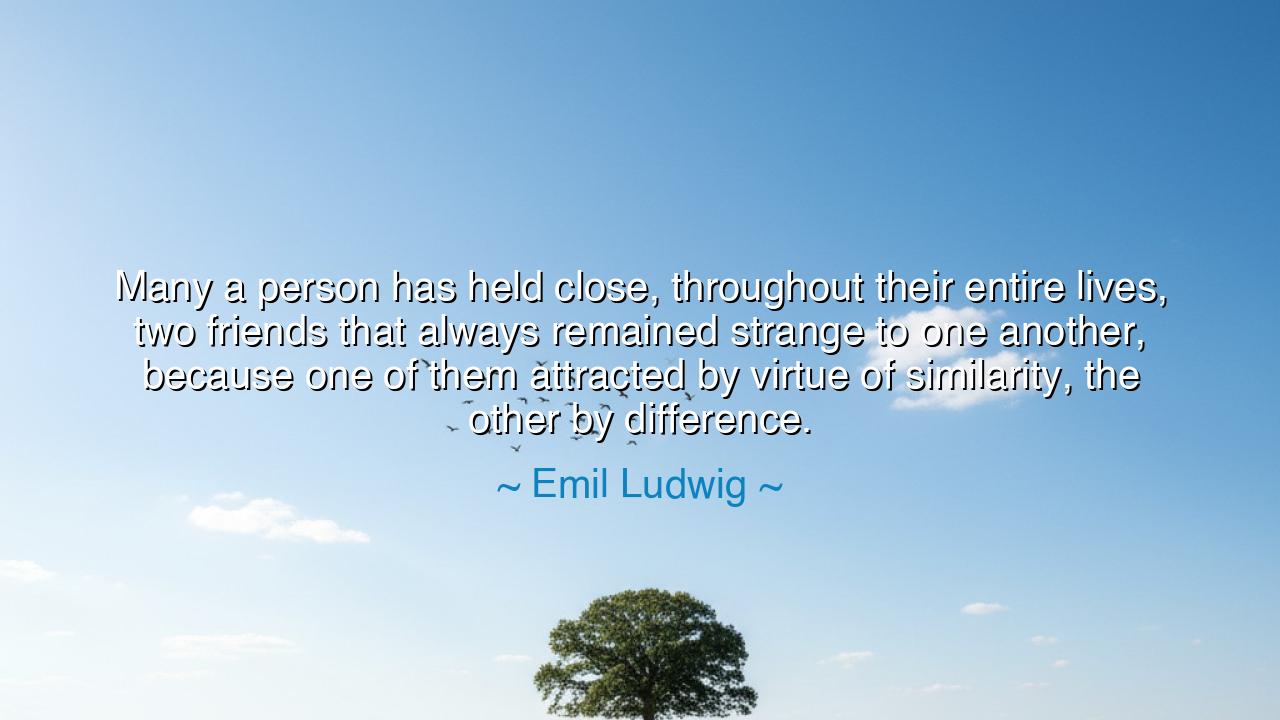
Many a person has held close, throughout their entire lives, two
Many a person has held close, throughout their entire lives, two friends that always remained strange to one another, because one of them attracted by virtue of similarity, the other by difference.






"Many a person has held close, throughout their entire lives, two friends that always remained strange to one another, because one of them attracted by virtue of similarity, the other by difference." Thus wrote Emil Ludwig, the historian and biographer whose pen sought to unveil not only the actions of great men, but the hidden currents of the human soul. In this single sentence, Ludwig reveals the dual nature of friendship — that it springs from two very different sources: similarity and difference. One friend mirrors us, reflecting our own nature back to us in harmony; the other challenges and expands us, pulling us toward what we are not. Together they form the two halves of the circle of human connection — one binding us to comfort, the other to growth.
In the quiet poetry of his observation, Ludwig speaks of a truth known to all who have lived long enough to love deeply: that no soul is complete in itself. The friend of similarity offers rest; the friend of difference offers awakening. With the first, we find understanding — the soothing sense that someone sees the world as we do, and thus confirms our own spirit. With the second, we find transformation — a friendship born not from likeness, but from contrast, from the fascination of encountering the unfamiliar. These two forces — likeness and difference — are the twin magnets of the heart. One draws us home; the other draws us forward.
The ancients themselves recognized this duality. Aristotle taught that friendship could exist for pleasure, for utility, or for virtue — yet even within virtue, there were friendships of sameness and friendships of contrast. The Stoics said that a man who is wise must walk with those who resemble his virtue, but also learn from those whose fire and folly temper his understanding. The wise have always known that to be surrounded only by likeness is to stagnate, and to live only among difference is to lose one’s center. The heart, therefore, seeks both: reflection and revelation.
Consider the life of Thomas Jefferson, whose closest companions embodied this paradox. With James Madison, he shared a friendship of similarity — both men scholars of governance, lovers of reason and republican liberty. Their minds moved in tandem, each reinforcing the other’s ideals. Yet with John Adams, Jefferson found a friendship of difference — contentious, fiery, and full of debate. They quarreled fiercely, drifted apart, and yet, in the twilight of their years, found one another again through mutual respect and wonder. Jefferson’s friendship with Madison strengthened his convictions; his friendship with Adams deepened his wisdom. Both men, though “strange to one another,” shaped the same soul in opposite ways.
This is the essence of Ludwig’s insight: that we hold both kinds of friends close, though they may never understand each other. The friend of similarity speaks to our inner peace — the reflection of our familiar self. The friend of difference speaks to our destiny — the whisper of what we might become. They are, in truth, opposites — one resting in the present, the other beckoning to the future. To live well, one must honor both, for the first gives comfort, and the second gives courage. Without one, the heart grows lonely; without the other, it grows narrow.
The wise among the ancients often said that the soul has two wings — one of stability and one of aspiration. So too do these two friendships give balance to life. The friend of likeness steadies us, reminding us that we belong; the friend of difference stirs us, reminding us that we must still grow. And though these friends may remain “strange to one another,” they are united within us, for both shape the person we are. The man or woman who cherishes both kinds of friendship walks the middle path between comfort and discovery — a life neither stagnant nor chaotic, but full of richness and breadth.
Lesson: Cherish both the friend who reflects your spirit and the friend who challenges it. One keeps your heart rooted; the other gives your soul wings. Between them lies the full wisdom of friendship — the harmony of likeness and the music of contrast.
Practical action: Look around you and see which of your friends brings you peace, and which stirs your thoughts to motion. Do not demand that they resemble one another, nor that one replace the other. Take them tenderly and truly, as Amos Bronson Alcott once wrote, for each serves a sacred purpose. With your kindred friend, rest and laugh; with your opposite, question and learn. For in the end, the self is not built by one kind of friendship alone, but by the divine balance of similarity and difference, each shaping the other, until the soul becomes whole.






AAdministratorAdministrator
Welcome, honored guests. Please leave a comment, we will respond soon